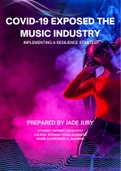,Title page
Title
COVID-19 exposed the music industry. Implementing a resilience strategy
Name Author
Jury, J
Student number
500807807
Class
FBE_L21_IB4E
Place and date of writing
Amsterdam, August 08, 2022
Educational Institution
Amsterdam University of Applied Science
Course
International Business
AMSIB Supervisor
A. Ghasemi
Company and supervisor
Company: Namam
Company Supervisor N. De Zwart
2
,Acknowledgment
First, I want to say this to my love, companions, and fiancé, Tomash. My inspiration is the source of
motivation and encouragement from you to constantly push my boundaries and step outside my
comfort zone. I completed this stage with his support and love—my best supporter, who is a source of
positive energy in my life.
And my dear mother, brother, and sister, whose words do not describe its greatness and the warmth
you have given me. I love you endlessly.
I am sincerely grateful to my supervisor, whose recommendations, patience, and support have led me
to achieve this work. And it would not be possible to complete this work without the kind support and
help of many individuals and organizations. Therefore, I would like to thank all of them sincerely.
Finally, thanks to the examination committee for devoting much of their time to reviewing and
discussing the study material.
Jade Jury
3
, Executive summary
Organizational resilience is an essential aspect of coping with crises. The coronavirus affected the music
industry hard. Namam, a Dutch artist management agency, had difficulties adapting to disruptive
environmental conditions. The literature encountered during the research suggests that organizations
seek to improve their resilience through a more strategic and risk management approach. Different
theories of organizational growth were discussed to build a foundation for understanding the topic and
mode of development. Internal and external barriers that add to previous studies' existing theories and
findings were identified. This research explores to what extent firms have been developing their
resilient business strategies by addressing firm performance and risk management. From this, the
research question is derived: How could Namam implement a resilience strategy to achieve an 87%
revenue increase in Belgium by the end of 2022?
This research study, situated in the music sector, seeks to uncover how organizations have adopted to
the execution of the pandemic. A combination of qualitative and quantitative content analysis has been
conducted. The context analysis is based on research from February to August 2022. This thesis argues
for a greater emphasis on resilience within the organization; this is generally understood as the ability
to self-organize in response to negative and positive interactions with the micro and macro-economic
environment. Organizational resilience requires a framework for enacting an enterprise risk framework
suitable for achieving competitive advantage and business continuity while protecting the interest and
values of the organization.
Future work is likely to include further quantification of the methodology and the resilience indicators,
resilience maturity models, and work on understanding resilient leadership, communication of
resilience concepts, and case studies to further determine the range of resilience for organizations.
Keywords: Organizational Resilience, Covid-19, Music industry, Competitive Advantage, Barriers
4




